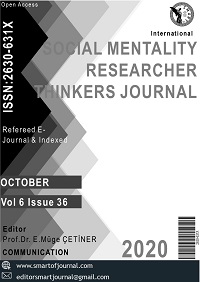Author :
Abstract
Bu çalışma katılımcıların duygu üzerine odaklanmaları sağlanarak depresyonun bireyler üzerinde etkisi incelenmiştir. Katılımcıların depresif düzeylerini belirlemek için Beck tarafından geliştirilen “Beck Depresyon Ölçeği” uygulanmıştır. Ölçme araçları uygulama öncesinde ön test, uygulamanın bitiminde ise son test uygulanmıştır. Araştırmada katılımcılara 5 oturumdan oluşan 90 dakika süren bir uygulama yapılmıştır. Araştırmanın örnekleri seçkisiz olarak atanan 30’u deney grubu 30’u kontrol grubu olarak atanan 60 katılımcıdan oluşmaktadır. Araştırmada öntest sontest ölçümlerine ilaveten izleme testi de uygulanmıştır. İzleme testi sontetst ile karşılaştırılarak araştırmanın etkinliğinin devam edip etmediğini belirlenmiştir. Araştırma sonucunda elde edilen verilerin analizinde SPSS 25.0 paket programından yararlanılmıştır. Ön test son ve izleme testleri puan karşılaştırmalarında, puanlar arasındaki farkın anlamlılığını test ilişkili örneklemler (tekrarlı ölçümler) için tek faktörlü ANOVA (one way ANOVA for repeated meesures) uygulanmıştır. Yapılan analizler sonucunda katılımcıların duygu üzerine odaklanmaları sağlanarak depresyon puanlarının anlamlı düzeyde azaldığını göstermiştir.
Keywords
Abstract
In this research, the effect of the participants on depression was examined by enabling the participants to focus on emotion. "Beck Depression Scale" developed by Beck was used to determine the depressive levels of the participants. The measurement tools were pre-tested before implementation, and post-tested at the end of the application. In the research, a 90-minute application consisting of 5 sessions was applied to the participants. The samples of the study consist of 60 participants, 30 of whom were assigned as experimental group and 30 of whom were assigned as control group randomly. In addition to the pretest and posttest measurements, the follow-up test was also applied in the study. The effectiveness of the study was determined by comparing the follow-up test with sontetst. SPSS 25.0 package program was used to analyze the data obtained as a result of the research. In the pre-test post and follow-up test score comparisons, single factor ANOVA (one way ANOVA for repeated meesures) was applied for the test-related samples (repeated measurements) for the significance of the difference between the scores. As a result of the analysis, it was shown that the depression scores of the participants were significantly reduced by enabling them to focus on emotion.
Keywords
- Abramson, L. Y., Metalsky, G. I., & Alloy, L. B. (1989). Hopelessness depression: A theory-based
- Abramson, L. Y., Metalsky, G. I., & Alloy, L. B. (1989). Hopelessness depression: A theory-based subtype of depression. Psychological review, 96(2), 358.
- Berking, M., Margraf, M., Ebert, D., Wupperman, P., Hofmann, S. G., & Junghanns, K. (2011).Deficits in emotion-regulation skills predict alcohol use during and after cognitive–behavioral therapy for alcohol dependence. Journal of consulting and clinical psychology, 79(3), 307.
- Forman, E. M., Herbert, J. D., Moitra, E., Yeomans, P. D., & Geller, P. A. (2007). A randomizedcontrolled effectiveness trial of acceptance and commitment therapy and cognitive therapy for anxiety and depression. Behavior modification, 31(6), 772-799.
- Gürbüz, S. ve Şahin, F. (2017). Sosyal bilimlerde araştırma yöntemi. Ankara: Seçkin Akademik ve Mesleki Yayınları.
- Hilgard, E. R. (1980). Consciousness in contemporary psychology. Annual review of Psychology, 31(1), 1-28.
- Isen A. M., Shalker T. E., Clark M. & Karp L. (1978) Affect. accessibility of material in memory. and behavior: a cognitive loop? J. Personalirg sot. Psycho/. 36. l-12.
- Kumar, S., Feldman, G., & Hayes, A. (2008). Changes in mindfulness and emotion regulation in an exposure-based cognitive therapy for depression. Cognitive Therapy and Research, 32(6), 734.
- Lloyd G. G & Lishman W. A. (1975) Erect of depression on the speed of recall of pleasant and unpleasant experiences. Psycho/. Med. 5, 173-180.
- Pashler, H. E. (1999). The psychology of attention. MIT press.
- Samoilov, A., & Goldfried, M. R. (2000). Role of emotion in cognitive‐behavior therapy. Clinical Psychology: science and practice, 7(4), 373-385.
- Schultz, D.P & Schultz, S.E. (2016). Modern Psikoloji Tarihi, (2016). İstanbul: Kaknüs Yayınları.
- Teasdale, J. D., Taylor, R., & Fogarty, S. J. (1980). Effects of induced elation-depression on theaccessibility of memories of happy and unhappy experiences. Behaviour Research and Therapy, 18(4), 339–346.





